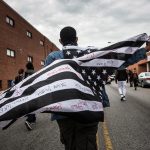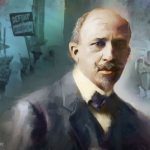From Minneapolis to the world
As the globe was colonised, the count of who was considered human narrowed, first along religious, then racial lines. Now, the fires of rebellion against this system are burning again.
Author:
1 June 2020

On 12 October 1492, Christopher Columbus, sailing in the service of Isabella and Ferdinand, the Catholic monarchs of Portugal and Spain, sighted land in the Caribbean. In that moment, the history of humanity was divided in two.
On 2 January that year, Muhammad XII of Granada had conceded defeat to Isabella and Ferdinand marking the end of almost eight centuries of Islamic power in the Iberian Peninsula. On 31 March, an edict was issued expelling practising Jews from Spain. Spain was now a solely Christian locus of power, and the initial justification for the genocide and enslavement that would be inflicted in the Caribbean and the Americas took a religious form.
In his Epistle to the Galatians, Paul the Apostle, the founder of Christianity, had affirmed the universal address of the new religion, writing, “There is neither Jew nor Greek, there is neither slave nor free man, there is neither male nor female.” Drawing on earlier practices reaching back to the Papal authorisation of the first Crusade in 1095, Spanish colonialism used the universal address of Christianity to draw a planetary line of exclusion from the count of the human. To be counted as human, you had to be counted as Christian.
In the centuries to come, cities were razed, land expropriated and people butchered, enslaved and worked to death in an orgy of unspeakable horrors legitimated in the name of religion. But in the 17th century, as the authority that religion had long wielded over Europe gave way to philosophy and science, the split in the count of the human acquired new forms of justification.
Related article:
What Frantz Fanon, writing in 1952, called the “Manichean delirium” of racial ideology fundamentally shaped the modern world. A number of scholars have argued that modern racism was invented in the English colony of Virginia. Some have argued that the decisive moment was the rebellion in the colony that came to a head on 19 September 1676, when rebels, including people who would now be counted as white and black, burnt Jamestown, its still precarious capital, to the ground.
Race, it is argued, enabled the colonial authority in Virginia to sustain its control over a diverse and often rebellious group of people subject to dispossession and forced labour by giving even the most oppressed among the Europeans, who now became whites, a stake in the system of domination.
Liberal racism
The great liberal thinkers, beginning with John Locke in the latter part of the 17th century, would offer secular justification for the split in the count of the human. It was made clear that the rights progressively offered under liberalism were not to be understood in universal terms. “Despotism,” the liberal philosopher John Stuart Mill would write in 1859, “is a legitimate form of government in dealing with barbarians.”
The enclosure of common lands in Europe, the expropriation of land in the New World, and the enslavement of indigenous people in the New World, and then African people, generated a previously unimaginable abundance of wealth in Europe and enabled the development of the new capitalist economy. European port cities like Liverpool and Marseilles became key sites for new forms of exchange and accumulation. When a new Exchange was built in Liverpool in 1754, it was circled with a set of friezes representing African heads. There was no reticence about openly affirming the monstrous source of the new wealth. From the outset, capitalism was a racial project “dripping”, as Karl Marx would write in 1867, “from head to toe, from every pore, with blood”.
Related article:
Slavery was extended and entrenched after the liberal revolutions in America in 1783 and France in 1789. Millions of Africans were captured, enslaved and taken to the New World before slavery was finally outlawed. The signal event in the defeat of slavery was the revolution against slavery in Haiti, which concluded in triumph on New Years’ Day in 1804. The armies of formerly enslaved people defeated the French, the Spanish and the English, the three great powers of the day, to win their freedom.
The resistance of enslaved people had always paid no regard to borders, and news of the revolution in Haiti rushed around the world, carried by black sailors and often inspiring new revolts. When enslaved people rose up on farms outside Cape Town in 1808, their leader, Louis van Mauritius, took great care to dress in the style of Toussaint Louverture, the first leader of the Haitian revolt.
Slavery was officially ended in the United States on 18 December 1865, after the end of the Civil War in April that year. In 1935, WEB du Bois, the great American intellectual of the 20th century, published Black Reconstruction in America, an extraordinary examination of the democratic possibilities that were raised and then dashed in the aftermath of the end of slavery. He showed that the key demand for a material basis for substantive equality was for land but that this demand was often received with “surprise and ridicule”.
Du Bois argued that “to have given each one of the million Negro free families a 40-acre freehold would have made a basis of real democracy in the US that might easily have transformed the modern world”. But without a material basis for substantive democratic equality, white supremacy was restored by the violent terror of a counterrevolution driven by an alliance between property owners and impoverished whites. This counterrevolution established a new system of domination organised around disenfranchisement and segregation. This is the project that the terror of Ku Klux Klan was organised to defend. We must recall that by the mid-1920s the Klan’s membership was estimated at between four and five million.
Related article:
This system of segregation, driven by white revanchism, and policed, until 1968, with regular public lynchings carried out in a carnival atmosphere, would shape the form that racism would take in other settler colonies like South Africa and Australia, as well as fascism in Europe. The Nazi race laws passed in November 1935 that excluded Jewish people from German citizenship were directly modelled on segregation in the American South.
Policing was central to sustaining white supremacy. In The Souls of Black Folk, first published in 1903, Du Bois wrote that in the American South, the “police system was arranged to deal with blacks alone, and tacitly assumed that every white man was ipso facto a member of that police”.
It was no different under apartheid. And from the suburban WhatsApp group, backed up by armed force in the form of private security, to the outraged white customer hysterically demanding to speak to the manager, this logic persists into the present.
Impunity for murder
As we all know, it also persists into the present in the US. A recent study shows that since 2005, around 15 000 people have died at the hands of law enforcement officers in the US. Less than 150 were charged with murder. In most of these 150 cases, the charges were dropped or the officers found not guilty. This generalised impunity for murder is profoundly raced.
Of course, the United States is far from being the only society where policing is an intensely racist project in which black lives are squandered with impunity. The situation in Brazil, France or, indeed, South Africa, is also grim. Our police, along with private security companies contracted to the state, and now the army too, shame, rob, brutalise, torture and murder impoverished black people with sickening regularity.
Related article:
Seen in historical context the rebellion currently under way in cities across the United States in response to the police murder of George Floyd in Minneapolis on 25 May 2020 is a new iteration in an arc of revolt that stretches back through Ferguson in 2014, to Los Angeles in 1992, the “long, hot summer” of 1967, and all the way back to the resistance on the plantations and slave ships that made America.
Donald Trump’s response to the rebellion repeatedly returns to the established language of American racism. He has called protestors “thugs”, a racially loaded term in America. Mobilising an image of terror that stretches back to the pursuit of escaped slaves and, more recently, attacks on the civil rights movement in the 1960s, he has threatened to set “the most vicious dogs” on protestors. As many reports have noted, his comment that “when the looting starts, the shooting starts” is not only a direct incitement to further state violence but also a direct repetition of an infamous statement made by a notoriously racist Miami police chief in 1967, the year in which riots against police racism convulsed Newark and Detroit.
In August 2017, Trump referred to the fascists who had marched in Charlottesville as “very fine people”. On Sunday he said that his government will designate “Antifa”, an abbreviation used to describe anti-fascist activists, “as a Terrorist Organization”. He has no legal authority to do this but for a president to affirm the social legitimacy of fascists and render their opponents as beyond the political pale is telling.
The long shadow of 1492
It is not just the racialisation of policing in the United States that continues into the present. One only has to look at how Western multinational corporations conduct themselves in the Congo, or how the exploitation of labour in a high-end restaurant in London or New York is racialised, to see that capitalism continues to be an intensely racial system. The US-backed coup in Haiti in 2004, and the enthusiastic support from the US state for the coup in Bolivia in November last year, show, plainly, that the US continues to aim to preside over a hierarchy of states that is itself intensely raced.
Related article:
In 2020 we still inhabit the epoch inaugurated by Columbus’s arrival in the Caribbean, an epoch in which, at the very moment that humanity was connected across the planet, vast numbers of people were excluded from the count of the human. The struggle to put a final end to that epoch, to affirm, in practice as well as law, a universal count of the human, has not yet been won.
But the fire lit by the insurgent universality of the Haitian Revolution was never fully extinguished. The sparks in the ashes of that fire periodically ignite in new revolts, that continue to shape politics across national boundaries. The growth in the Black Lives Matters movement following the rebellion in Ferguson in August 2014 became a global event. In South Africa, it was a significant influence on the student movement that emerged on university campuses in 2015. What is won, or lost, in the streets of American cities in the rebellion now under way will not only matter in Minneapolis, Philadelphia, Baltimore and cities across the US. It will also matter in the streets of Sao Paulo, Paris and Johannesburg.





